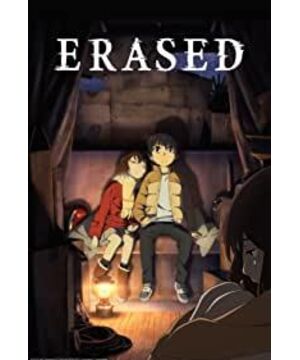There have always been animation works about traveling through time and space and time back, and they have won a good reputation. For example, "Stone Gate", "Re0", "The Girl Who Traveled Through Time", etc., "Only a city where I am not there" is different in that the protagonist cannot actively choose the time and time to jump, nor is it triggered by death. Ability. Although there was no hype and promotion when the animation was released, it still achieved good results.
The protagonist Fujinuma Satoru has an ability called "re-screening". When there is danger around him, this ability will bring him back to 1-5 minutes before, and watch the same scene repeatedly to find a sense of discord, so as to avoid Dangers happen around you, at the cost of some harm to yourself. And his ability is not innate, but stems from a child abduction case in his elementary school-the disappearance and murder of his classmate Kayo Hinizuki, and his childhood playmate Courage is considered to be the murderer. "I could have helped her" this deep self-blame that couldn't find an outlet gave him the ability to help those around him.
Under the reminder of his mother, he tried to find clues about the past abduction incidents, and at the same time, he slowly opened up the memories that were deliberately blocked because of self-blame. However, something unfortunate happened again - Satoru's mother was murdered after seeing the identity of the criminal, and Satoru was framed as the murderer. This time, because of the origin of the case, he went straight back to 18 years ago, before the abduction case (in the fifth grade of elementary school), and had a chance to change history, save his classmates and mother, and redeem himself.
Satoru believes that as long as the case does not happen at the original time, the whole incident will disappear. First of all, he must follow the "victim" closely. When he observed Kayo Hinazuki, he finally discovered the hidden hiddenness that he had not observed when he was a child as a 29-year-old soul. The details and truth of Kadai saw Kadai's grief (the ten-year-old Kadai's wish is to go to a city without pain, sorrow, and no one else.) So he wants to protect Kadai even more.
So Kadai passed the "disappearance day" safely with Satoru's efforts. When he was very excited to think that he was successful, Kadai disappeared, so Satoru's efforts only delayed the incident by one day. Satoru discovers that when he tries to change history, fate always returns to its original track. Meanwhile, Kadai's mother's indifference to her daughter's disappearance leaves Satoru feeling powerless and unable to speak.
Time goes back again, and how can I redeem myself when I go back to the enlightenment of my childhood? How to save dying lives? Of course, the ending must be that Wu changed history and got redemption. But he also paid the price of going back in time and became the person who did not exist. (As if there were no spoilers for the criminals)
"There is only one truth", but behind the truth, there are a series of social problems, stories that fill the gaps in the heart. About domestic violence, about campus cold violence, about lies and trust crisis. In the cold reality, the ordinary warmth is even more moving. Jiadai was moved to tears by a hot breakfast. The boys temporarily formed a "teenage detective team" to avoid the danger of their classmates being left alone. Moments, even if they are just children, still seem so loving.
It is worth noting that in the op of episode 11 of the animation, the image of the male protagonist was deleted, which just echoed the name of the animation, "Only the city where I am not there".
Because it is a suspenseful reasoning animation, there will be reversals, and of course, there will be a thrilling sense of the enemy's dark and my bright, and the ending may not be the same as you guessed. That's about it - don't think what you think is what you think.
Guessing: I don't know if Fujinuma Satoru is an insinuation of the author's three works. The works of ordinary cartoonists are all good, but there is nothing particularly outstanding, and at the end of the film, Satoru has successfully drawn a good work that taps into his heart. Recognized as himself.
As we grow up, we encounter many things that we regret. We often miss the right moment because we are cowardly, indifferent, or arrogant, or we fail to stand up and say , "If I Just do it", "I could have..." After all, we have no regret medicine, and we can't choose to start over at a certain moment and a certain place like the game settings. So this prompts us to be more sincere, face life bravely, and reduce regrets.
View more about Erased reviews











